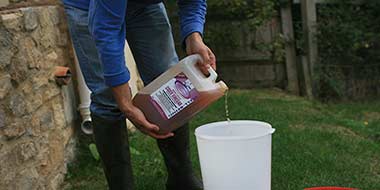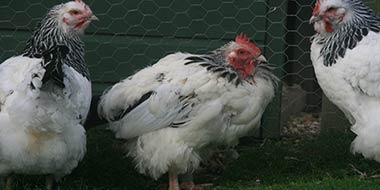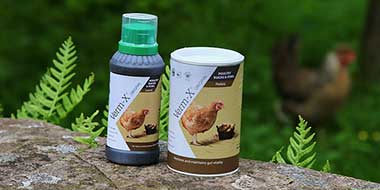
Keeping
Chickens
Healthy
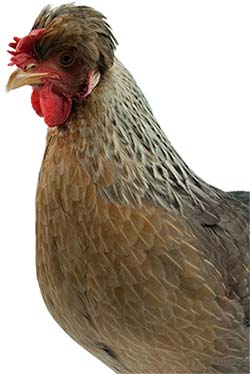
Garlic was used by the ancient Egyptians for medicinal purposes and is still popular today as a health supplement.
In European countries where they consume large amounts of garlic in their diets, they have a lower risk of cancer and are less likely to suffer from heart disease, but what about garlic for chickens?
Chicken keepers have been giving raw garlic to their hens for hundreds of years, possibly longer, to help them treat infection, respiratory problems, and improve their appetite.
Some say it even improves the size and quality of the eggs they lay. Sulphur from droppings also decreases after a few weeks, which can make your chicken coop and run smell better.
When freshly crushed, garlic releases allicin and allicetoins that have antibacterial properties. Louis Pasteur discovered this as far back as 1858. It is known to kill only the harmful bacteria or ‘pathogens’ and not the ‘good’ bacteria. Still, many believe allicin is a deterrent to the ectoparasite red mite due to the chicken’s blood taste.
You will find garlic in some red mite treatments such as ‘Breck-a-Sol’, an acaricide approved for use in the U.K.
The benefit of garlic for chickens.
Although garlic is a natural product, any external preparation added to your bird’s diet should be introduced gradually and tested in a small quantity at first.
Here is a list of what garlic might be useful for:
- Garlic can be used on birds' skin as an antiseptic for minor wounds and abrasions.
- Added to the diet, it may help the gut environment, making it less attractive to internal parasites (worms).
However, I must stress that if you are taking a natural approach to worming, you should accompany this with a poultry worm count to check it is working. It should not be used for confirmed cases of worms. I could find little research in this area, although many poultry keepers believe it does help.
Some old books suggest a strong solution of crushed garlic for chickens, but then again old books offer many remedies that we now know don’t work, and there are many ‘Old Wives Tales’ when it comes to poultry keeping!
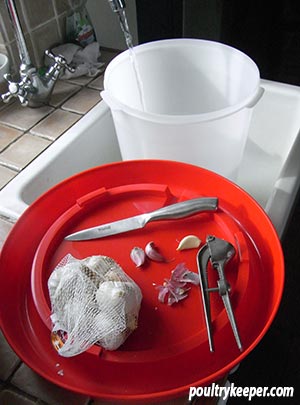
- It can be rubbed into the legs to help prevent parasites such as scaly leg mite, and there have been studies that have shown it reduces the incidence of Northern Fowl mite*.
- A few cloves crushed into chicken's water can make a tonic that may help boost the immune system.
- The respiratory system can benefit from breathing steam which has (fresh) garlic infused into it.
Place the bird into a show cage/puppy crate anywhere that can be covered on top with plastic easily (still allowing enough air to breathe) and placing a steaming bowl under the plastic -but- outside of the cage (so your bird doesn’t get burnt). It can help their breathing as an expectorant and receives the active anti-inflammatory ingredients directly into the lungs.
*Topical application of garlic reduces northern fowl mite infestation in laying hens: Birrenkott et al. (2000)
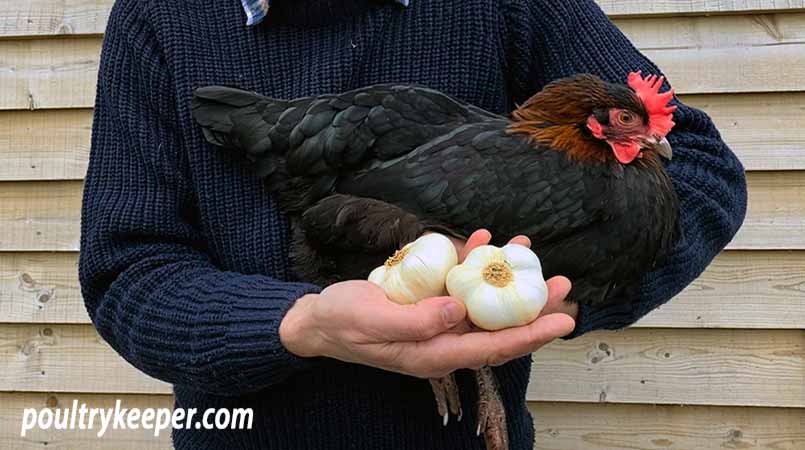
Is fresh, raw garlic better?
There seems to be an age-old argument in the health food domain. Some studies suggest it might be better to use raw garlic, but it’s far from clear. There are numerous poultry stores online selling dried garlic granules that can easily be added to water from a bag, and these are a popular choice amongst poultry keepers.
I keep a bag of these garlic granules for the days when we have run out of fresh garlic, or when I’m in a hurry. I add abount three pinches into a 6-litre poultry drinker, although most of the time, I crush fresh cloves into my chicken’s drinking water.
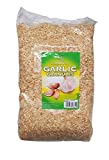
Won't my chicken's eggs taste of garlic?
Garlic reduces the sulphur content of eggs, which gives them a slightly different taste. If you add a lot of garlic to your hen’s diet, they will, without doubt, start to taste different.
Clemson University did a taste study on eggs from hens fed 3% garlic (which is a huge amount of garlic when you think about it, 600g per 20Kg feed sack) and kept some other hens in a control group. They offered eggs to tasters from both groups, and they prefered the taste of eggs from garlic fed hens.**
I add about three crushed cloves to a 6-litre water container and can’t taste any difference in the eggs I eat. I would be interested to have some feedback in the comments below though if you can detect any changes in taste?
**Reported in Science Daily November 19th 1998
My conclusions on garlic for chickens
I don’t believe garlic for chickens is a miracle cure, and as with a lot of health remedies, many of the claims are subjective rather than scientific. Still, if you’re open-minded, I would say there can be no harm in giving garlic to your chickens, (it’s cheap enough to try).
There are some scientific studies that suggest garlic for chickens is beneficial, so for their general health, with a balanced diet (feeding chickens correctly is particularly important), then it is likely to be helping them.
I use garlic from time to time and use it as part of an all-around healthy approach for my chickens. The health product I use more regularly and would suggest you also try is apple cider vinegar. I have seen some very positive results over the years of using this.

